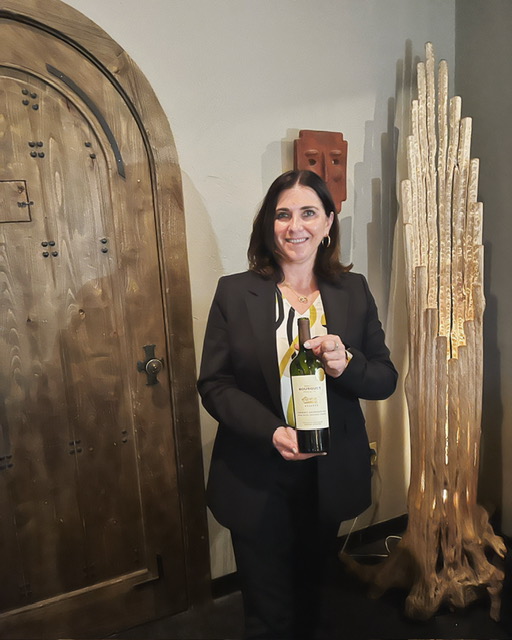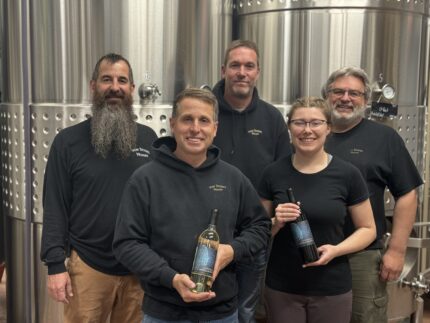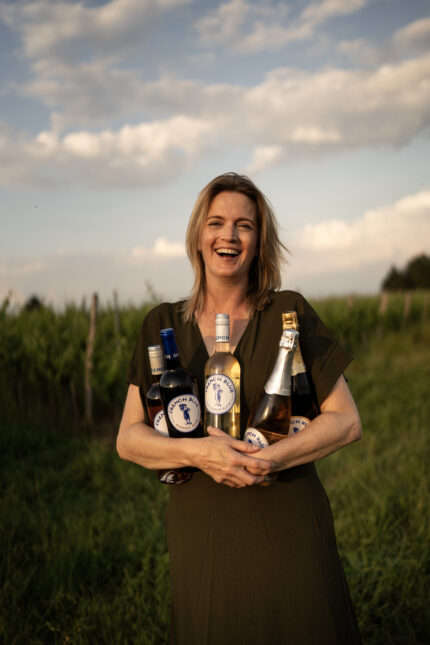Recently, I’ve had the chance to reconnect with winemakers from past columns, and it’s truly impressive to witness not only the realization but also the notable surpassing of goals discussed in earlier interviews. Anne Bousquet, co-owner of Domaine Bousquet, stands out as a prime example from Argentina. Over the last 25 years, Domaine Bousquet has epitomized value-oriented, biodynamic, and organic winemaking, successfully setting, and achieving measurable and ambitious objectives.
When I talked to Anne two years ago, she set a significant goal called “Cultivating for a Better Future: One Pillar at a Time,” with a three-pillar commitment to environmental, social, and economic aspects. Beyond the ongoing work, she emphasized water preservation and improving the winery’s carbon footprint. To ensure accountability and progress, a full-time environmental position was created, which has grown into a department.
This goal reached fruition when Domaine Bousquet became the first Argentine winery and the fourth global winery to achieve Regenerative Organic Certification (ROC) from the Regenerative Organic Alliance. This certification emphasizes soil health and land management, animal welfare, and equity between farmers and workers.
In addition, the winery earned certification as a B Corp company, a for-profit corporation certified by B Lab, a non-profit organization measuring a company’s social and environmental performance against standards in the B Impact Assessment.
This achievement stands as a great example of accountability in action.
A Little History
In 1990, the Bousquet Family arrived in Mendoza from France to research the vineyards and wineries in the Uco Valley in Argentina. Her dad, Jean, was looking for a place that would make great wines with high altitudes, sandy soils, and ideal temperatures. He planted the vines, dug a well, and started Domaine Bousquet. The 110-hectare vineyard is in the Gualtallary Valley in Tupungato, Mendoza. The goal was to bring together European wine making using the ideal conditions of the Mendoza climate.
The winery is the most awarded organic winery in the world. Aside from the certifications from every organic certification you can think of from ARGENCERT in Argentina, which is recognized in the U.S. by USDA NOP (National Organic Program) and in the European Union by ECOSERT to GNV-GL ISO-9001, they practice what they preach from respect of nature, the way they use filtered water and recycle what they use and the complete lack of chemicals.
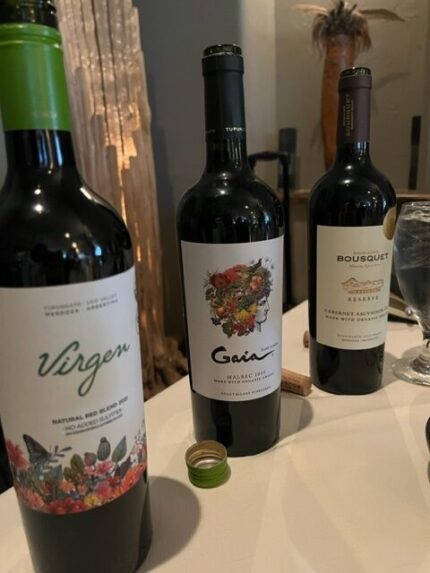
Anne’s journey into the wine business didn’t begin immediately. Initially, she spent a decade as a renowned economist in the pulp and paper industry, where she earned global recognition as a speaker on market dynamics. While maintaining her career in economics, she also played a pivotal role in the family business during a period of explosive growth for the winery.
The turning point came in 2004 when Anne presented the family wines at a wine fair in Miami. To her surprise, the Malbec emerged as a top winner in a blind wine tasting competition. This marked a significant moment, prompting her husband, Labid, to join Domaine Bousquet. He decided to transition from his career in stock trading at Fidelity to work full-time at the winery.
In 2006, another pivotal moment for the company arose when Sweden expressed a desire to broaden its Argentinian portfolio, specifically aiming to meet a percentage quota for organic wines. Domaine Bousquet wines emerged as the ideal solution, prompting the country to place an order for 250,000 liters. This marked a significant juncture, leading Anne to decide to join the company on a full-time basis.
She emphasized the significance of the land and underscored the family’s commitment to being certified organic. “We bought the land in 1997, and it was virgin territory,” she explained. “Being among the first settlers, we feel a responsibility to leave it in pristine condition.” In a previous interview, she likened their approach to organic practices to the distinction between being “engaged and married.” She compared Oco Valley to Sonoma Valley in California.
Today the winery has 618 acres under vine with all grapes grown organically, and they’ve helped growers around Tupungato make an organic shift using French traditional methods. They have long-term relationships with growers who work to obtain the same organic certifications. Before the blends are decided, the staff and growers have a blind tasting to rank the wine and see where they need to improve next year.
Anne told me, “Since the beginning, we have remained committed to the pursuit of quality and to being at the forefront of sustainability in all our endeavors.”
Domaine Bousquet Tasting:
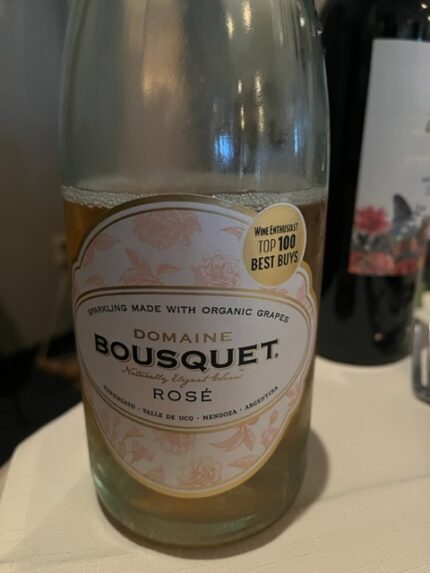
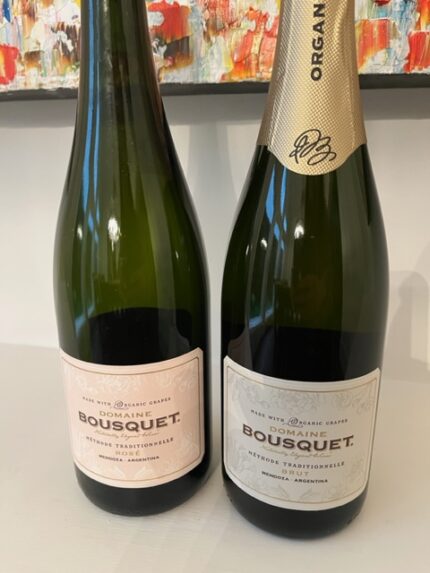
We tried a lineup of diverse wines that are part of the company’s brand portfolio (and I had a few samples that I timed to drink for this story). They were all well-priced and all tasted more expensive than the price tag attached. They started an import company to showcase certified organic wines coming from all regions, so that helps with pricing.
- 2022 Domaine Bousquet Organic Rosé – I tasted notes of strawberries, red cherries, orange, and herbal notes.
- NV Domaine Bousquet Rosé – This blend of 75% Pinot Noir and 25% Chardonnay had notes of ripe red fruit, citrus, tropical fruit, and toast.
- NV Domaine Bousquet Brut – I tasted green apple, citrus, tropical and fresh baked bread. While both are made in the Charmat method, the winery also makes traditional sparkling.
- 2021 Virgen Red Blend — Virgen is not only made from organic fruit but has no sulfites added qualifying it for organic USDA certification. This region is known as the driest in the world. This was a balanced wine with black and red fruit, herbs, and spice.
- 2021 Gaia Organic Malbec – The wine is named after GAIA, the Greek goddess of the earth. It’s a big, but balanced wine with black and fruit, licorice, herbs, and flowers.
- 2022 Domaine Bousquet Reserve Cabernet Sauvignon – An elegant wine with red and black fruit, vanilla, oak, and black pepper.
Domaine Bousquet stands not only as a family winery success story but also as a testament to the benefits of sustainable excellence. From their early days of pioneering organic practices to achieving global recognition through certifications like Regenerative Organic Certification and B Corp, the winery’s commitment to the environment, social responsibility, and quality winemaking continues. Anne Bousquet’s remarkable journey, from a renowned economist to a driver in the family’s winemaking legacy, showcases the fusion of passion, dedication, and a deep respect for the land. Domaine Bousquet isn’t just crafting wines; they are cultivating a legacy of sustainability, accountability, and exceptional taste.
And for those of you still not onboard with organic, the IWSC announced Domaine Bousquet as the trophy winner for the overall best red wine producer.
Need I say more?
